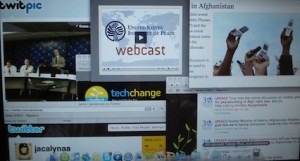The importance of both mobile network and software security continues to grow as more personal and significant information is communicated wirelessly. Two new attacks threaten the security of the GSM standard, an unwanted headache for mApp developers, while two others threaten the Android and Apple families of moblie operating systems.
Tag: mobile phones
The BlackBerry smartphone, launched in 1999 by Research In Motion (RIM), is the quintessential, on-the-go tool for communicating. In 2004 BlackBerry had over two million subscribers worldwide, one of the key selling points has been the unique ability to use the free Blackberry Messenger service (BBM) to communicate with fellow Blackberry users. Now however that usage has been banned in the United Arab Emirates (UAE) because it bypasses their ability to monitor communications.
Today’s Tech@State event produced some great insights into current uses and future applications for mobile money. The presenters did a wonderful job detailing the different models currently being used to engage the billions who are unbanked but have access to a mobile device. Some key take-aways from the day were (1) the need to focus on user inputs, (2) the importance of building a network of physical agents, (3) and possibilities for other services that are enabled once a successful mobile money system is established.
Last month I taught the first ever course on “Technology and Peace” at the UN-mandated University for Peace (UPEACE) in Costa Rica. The course drew 16 participants from 11 countries, representing a number of distinguished organizations including Ashoka, the Council on Foreign Relations and George Mason University’s Institute for Conflict Analysis and Resolution (ICAR).
With the help of Leonardo DiCaprio, we know what blood diamonds are. And now, thanks to the Enough Project, we are starting to know more about conflict minerals. Conflict minerals are generally defined as: “minerals mined in conditions of armed conflict and human rights abuses, notably in the eastern provinces of the Democratic Republic of the Congo, by the Congolese National Army and various armed rebel groups, including the Democratic Forces for the Liberation of Rwanda”.
Any banking services. While those in the developed world take it for granted, easy access to a bank is a luxury unknown to most. Throw in a devastating earthquake that knocks out a third of the banks and ATMs in the country and you can see why Bill Gates is banking on mobile phones to help expand financial access in Haiti. His foundation recently set up a $10 million fund to provide grants to the first firm to implement a qualifying mobile banking system as well as the first to process five million transactions.
 Yesterday’s Can You Help Me Now? Mobile Phones and Peacebuilding In Afghanistan panel at the United States Institute for Peace (USIP) showcased experts on Afghanistan from all walks of life—government officials, programmers, and even social media gurus.
Yesterday’s Can You Help Me Now? Mobile Phones and Peacebuilding In Afghanistan panel at the United States Institute for Peace (USIP) showcased experts on Afghanistan from all walks of life—government officials, programmers, and even social media gurus.
This event drew in a crowd of enthusiastic Twitterers using the hashtag #usipmobile, sharing questions and comments throughout the event and highlighting some of the key quotes of the day. Corresponding with the panel discussion, Twitter users tweeted about everything from improving governance (i.e. rule of law and anti-corruption) to countering extremism (i.e. media development and counter-insurgency) to delivery of essential services (i.e. education, health, agricultural development, and commerce).
